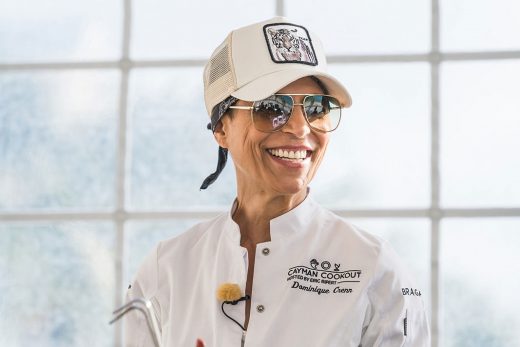This famous chef made her restaurants meat-free. But soon she’ll be putting ‘cell-cultured’ chicken on the menu
In 2019, Michelin-starred chef Dominique Crenn announced that her Bay Area restaurants would go meat-free, focusing instead on local seafood and vegetables. It was a decision based not on what her customers wanted, she said at the time, but on “what this planet needs,” citing the environmental harm that comes with animal farming and meat production. But Crenn is getting ready to put chicken back on her menu through a partnership with cultivated-meat company Upside Foods.
Based in Berkeley, California, Upside Foods has been working on cultivated meat, also called cell-cultured meat (but don’t call it lab-grown meat, CEO Uma Valeti says; it’s not made in a lab, but a production facility just like any other food) since 2015. Cultivated meat is grown from animal cells, rather than from farming and slaughtering animals. Upside (which was previously known as Memphis Meats) announced the partnership with Crenn, for which the chef will provide culinary counsel and work on recipe development.
Crenn’s three-Michelin-starred restaurant, Atelier Crenn, in San Francisco will also serve Upside chicken once regulatory review is completed. “I removed meat from my menus years ago because I didn’t like the practices of factory farming—the treatment of animals, the impact on the environment,” she says via email. “Upside Foods takes factory farming out of the equation.”
It’s unclear when regulatory approval will happen, but Valeti says he’s been working with the Food and Drug Administration and the U.S. Department of Agriculture for the past few years. The cultivated-meat industry is looking for that approval to happen in the next few months, and Valeti says he wants his company to be ready to get Upside chicken to customers when it does. (In December 2020, Eat Just’s cell-cultured chicken received the world’s first regulatory approval in Singapore.)
Valeti emphasizes that Upside chicken is not a meat alternative, but the real thing, just grown in a different way. Crenn says the same: “I don’t view this as a meat alternative for vegetarians or vegans, it’s chicken and it’s delicious,” she says. Crenn has said in the past that she’s not a vegetarian, just conscious of her restaurant sourcing, and that she’s had concerns about “the provenance of vegan products” available, noting many are highly processed. “People should ask themselves, Where is my food coming from? How is it created? What impact does it have on our planet?” she says. “Upside Foods is cultivating real meat from real cells, helping to build a new, sustainable food system.”
The cultivated-meat industry is still new, and when its products are manufactured at scale, facilities will be closer to where meat is consumed, use fewer resources, and produce lower greenhouse gas emissions, Valeti says. He hopes that signing on a Michelin-starred chef can help spread the word and get Crenn’s peers and customers excited about the world of cultivated meat. Though this partnership won’t involve replacing farmed chicken dishes since Crenn’s restaurants haven’t served poultry for years, Valeti is still certain that it will bring his products to the meat eaters who could eventually choose cultivated meat over farmed options.
“People who come to Dominique’s restaurant, the majority of them are meat eaters. They understand the taste of meat, they love the taste of meat, and they do understand at a deeper level that meat needs to be more sustainable,” he says. “Once they start seeing that opportunity in front of them on their plate, start tasting it, and they recognize the experience of it, I think it just opens incredible possibilities.”
(58)



